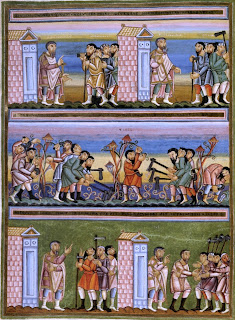(Sunday before Ash Wednesday, 7th Sunday before Easter)
Luke 18: 18-34
One of the highest spiritual leaders of the people asked him, “Good Master, what must I do to obtain eternal life?”
Jesus answered him, “Why do you call me good? No one is good but One—God alone. You know the commandments, you shall not destroy marriage, you shall not kill, you shall not steal, you shall not speak untruth, and you shall honor your father and your mother!
 |
| The Rich Young Man |
He said, “All these I have observed strictly from my youth.”
When Jesus heard this, he said, [Jesus, looking at him, loved him and said… Mk 10:21] “One thing, however,
you lack: Sell all of your possessions and give the money to the poor; thus will you achieve a treasure in the spiritual world—then come and follow me!
He was sad about these words, for he was very rich. And when Jesus saw him thus, he said, “What hindrances must those overcome who are rich in outer or inner possessions, if they want to enter into the kingdom of God. Sooner would a camel walk through the eye of a needle than a rich man be able to find the entrance to the kingdom of God!”
Those who heard this said, “Who then can be saved?”
He said, “For man alone it is impossible; it will be possible however through the power of God working in man.”
Then Peter said to him, “Behold, we have given up everything to follow you.”
He replied, “Amen, the truth I say to you. No one who leaves home or wife, or brother or parents or children for the sake of the kingdom of God will fail to receive many times as much in earthly life, and in the age to come eternal life.”
Then he took the twelve to himself and said, “Now we are going up to Jerusalem, and everything which the prophets have written about the Son of Man will fulfill itself: He will be given over to the peoples of the world; they will mock and taunt him, they will spit upon him and scourge him and kill him, but on the third day he will rise up from the dead.”
Yet his disciples understood nothing of all this. The meaning of his words remained hidden from them, and they did not recognize what he was trying to tell them.
4th February Trinity
February 26, 2017
(Sunday before Ash Wednesday, 7th Sunday before Easter)
Luke 18: 18-34
The rich young man had been pursuing a spiritual path. He wanted to develop the capacity to live in the eternal. Through strict adherence to the commandments, he had fashioned himself into a worthy vessel. And that vessel was full of the spiritual riches of his people and the hard-won treasures of the inner life, which had won him the esteem of his people.
Christ now discerns that the young man had gone as far as it was possible to go along the old way. And now it is time for him to step onto a new path. But before he can do so, he must be willing to sacrifice all that he had hitherto achieved.
 |
| Sombart |
It is a new path that Christ himself will build with him, a path of inner and outer sacrifice. 'Sell all of your possessions; give the money to the poor and then come and follow me.' This Christ-path starts as a path of renunciation, a path toward and into death. The rich young man is to give up everything he had achieved and embark toward something totally new. He is to walk consciously, with Christ, toward death. And Christ is the one who is indeed the Way itself. John 14:6
Naturally, it was a shock for him to realize this. It must have been like receiving a terminal diagnosis. Naturally, he would be sad over the impending losses. And perhaps one of the greatest griefs would be the loss of his identity. Yet walk he does.
 |
| Sombart |
Although Luke's gospel doesn't say anything further about the rich young man, Mark's gospel gives us a hint: 'Jesus, looking at him, loved him.' (Mark 10:21). And John's Gospel refers to Lazarus as one whom Jesus loved. So we may perhaps assume how the young man's further story actually unfolds: as Lazarus, he is indeed led by Christ into death (John 11). And he is called
forth out of death by Christ. Christ initiates him into the mysteries of death so that the young man can stand by and accompany Christ with understanding when He Himself dies and comes forth from the dead.
As William Penn said,
They that love beyond the world cannot be separated by it. Death cannot kill what never dies. Nor can spirits ever be divided, that love and live in the same divine principle . . . *
Visit our Website!





















